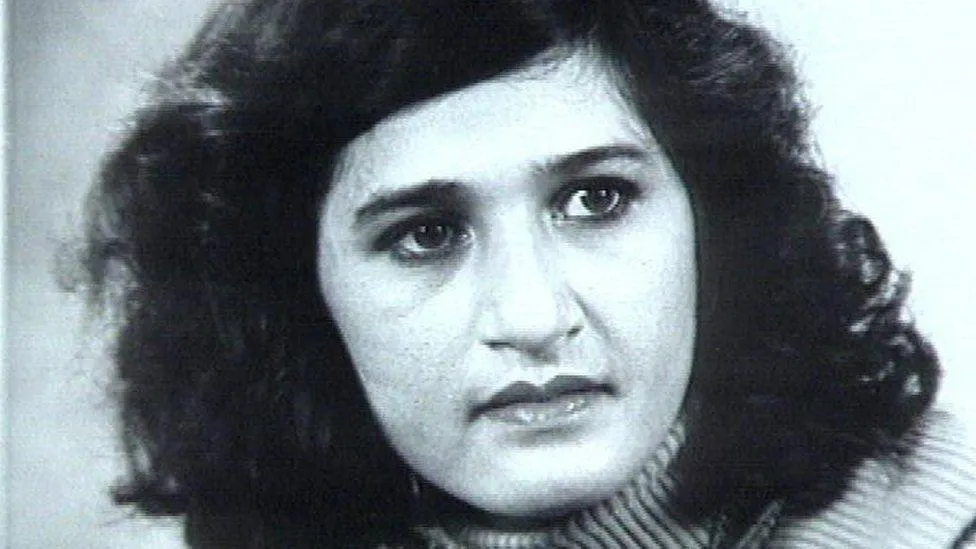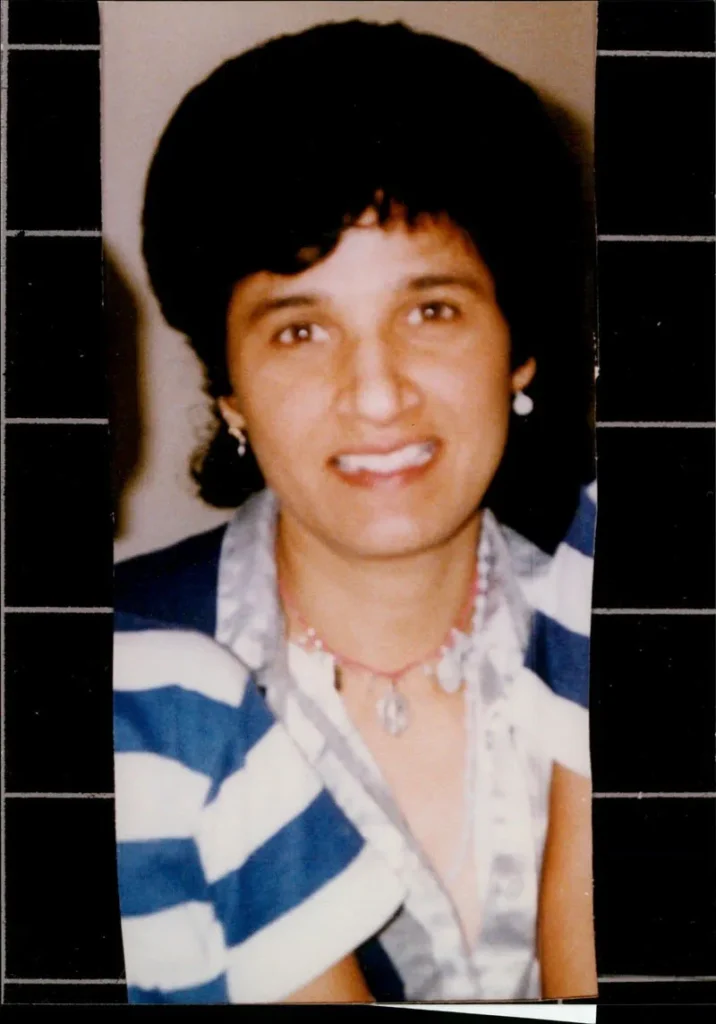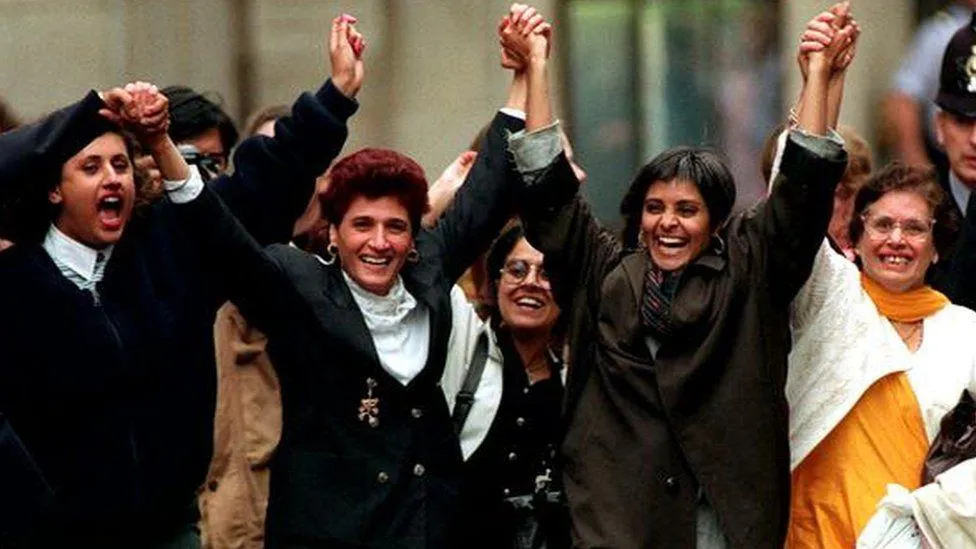In a simmering rage that had been building up over many years, the woman approached her husband’s bedroom while he was asleep, poured gasoline, and threw a burning stick inside.
After enduring continuous abuse for 10 years, Kiranjit Ahluwalia rose up in resistance by pouring gasoline and setting her husband on fire. This case not only shook public opinion in the UK but also garnered attention worldwide.

The Fire in the Night
One evening on May 9, 1989, Kiranjit Ahluwalia, an Indian woman living in a small town in England, served dinner to her husband as usual. Kiranjit wanted to discuss their strained relationship and find ways to mend their marriage. However, in return, her husband – Deepak Ahluwalia demanded £200 from his wife and threatened to beat her if she didn’t comply.
The next morning, while Deepak was asleep, Kiranjit, unable to close her eyes, approached her husband’s room and poured gasoline, then threw a burning stick inside. The flames quickly erupted fiercely.
The heat woke up Deepak, who quickly realized his predicament. During the fire, the man tried to run out of the room while threatening to kill his wife.
Neighbors rushed to the burning house. Kiranjit was inside, holding her son, staring at the brightly lit window. Despite the frightened calls from the neighbors urging her to come out, Kiranjit refused. “I’m waiting for my husband,” she said.
Eventually, she agreed to hand over her child and was taken outside. Meanwhile, firefighters found Deepak in a state of delirium.
The Arranged Marriage
Deepak suffered severe burns and passed away at the hospital a few days later. Kiranjit was arrested on charges of murder. From this point on, everything that happened in this house was clarified.
Ten years earlier, in 1979, Kiranjit was forced to leave her home in Punjab, India, to come to distant England at the age of 24.
Both of her parents had passed away when she was 16. At that time, Kiranjit had completed her university education and intended to pursue a law degree. However, Kiranjit was pressured by her brothers to enter into an arranged marriage with a man she didn’t know and had only met once.
Unable to resist, Kiranjit had to give up her educational path, get married, and move to live with her husband’s family in London with limited English proficiency.
But very quickly, she realized that her life had fallen into a deep and tragic abyss. Violence and humiliation appeared just two days after the wedding.
Kiranjit later said that Deepak “changed overnight,” transforming into a completely different person. This marked the beginning of ten years filled with haunting days of domestic violence, and abuse, both physical and psychological.
10 Years of Abuse

Just 2 days after their wedding, Kiranjit Ahluwalia began to suffer abuse from her husband, Deepak Ahluwalia. She was kicked, punched, slapped, choked, beaten with belts or shoes, and threatened with knives, and hot irons. Deepak also frequently threatened to kill Kiranjit.
“He pushed, pulled my hair, beat me, and dropped heavy pans on my feet,” Kiranjit said she was treated like a slave.
Deepak controlled his wife’s behavior to the extent that he even forbade her from eating spicy food or drinking black coffee just because those were things she liked. “But I was too scared of him to say anything. At night, I often stayed awake next to him because I couldn’t sleep out of fear,” Kiranjit recalled.
Deepak also frequently physically abused his wife, claiming it was his right, and often beat her unconscious. Kiranjit was prohibited from meeting friends or family by Deepak, who didn’t want his wife to be “Westernized” and virtually isolated her.
Kiranjit feared having children because she believed that she would never be able to leave her husband, but she was pressured by her husband’s family. Over the years, she gave birth to two sons. The boys were very afraid of their father, often witnessing him beating their mother, and were also subjected to violence.
Deepak had romantic relationships with other women while continuing to abuse his wife almost every day, even using his infidelity to mock her.
Although living together, Kiranjit did not receive any help from her husband’s family. They were threatened by Deepak if they dared to intervene. Kiranjit then asked for help from his relatives. But instead of helping, they blamed her and said that staying with her husband was a matter of family honor. They told her to go back and be “a good wife,” saying that her duty was to “make the marriage successful.”
The Deadly Outburst of Rage
With the frequent beatings from her husband, Deepak was eventually issued two restraining orders by the court. However, despite that, he continued his violent and abusive behavior.
Kiranjit had tried to leave the house but was found and brought back by her husband. She started drinking alcohol to numb the pain, although she was very ashamed of this behavior. She also overdosed on medication twice.
All the pain and suffering in her life had exceeded her tolerance, and on May 9, 1989, Kiranjit finally erupted.
On that fateful evening, Kiranjit told her husband that she wanted to try to mend their marriage but received beatings in return. Later, even though she had gone to bed, she was awakened by her husband and demanded money. When she refused, Deepak twisted her leg and held a hot iron against her face.
By midnight, Deepak fell asleep and Kiranjit burst into the rage she had been suppressing for the past 10 years. She was afraid to stay in this house, but she was also afraid of the consequences of running away. The 34-year-old woman felt trapped. Finally, she approached her husband with fire and a can of gasoline, pouring it on his legs.
“I decided to show him how painful it was. There were times when I wanted to run away, but he caught me and beat me even harder. I decided to burn his legs so he couldn’t chase after me,” Kiranjit confessed.
Controversial Crime
In a suppressed rage accumulated over 10 years, Kiranjit Ahluwalia quietly approached her sleeping husband with fire and a can of gasoline. Deepak Ahluwalia suffered burns over more than 40% of his body and died in the hospital, while Kiranjit was arrested on charges of murder.

At the trial in December 1989, the prosecution argued that although Kiranjit was beaten and threatened by her husband with a hot iron on the night of the incident, her waiting until her husband fell asleep was evidence that she had time to think and carefully consider her actions.
Furthermore, the prosecution argued that Kiranjit’s knowledge of mixing caustic soda with gasoline to create napalm bombs was not common knowledge and was evidence that she had planned to kill her husband.
While the defense attorney failed to make a strong argument about the violent acts Kiranjit had endured, the prosecution claimed that Kiranjit was driven by jealousy due to her husband’s repeated infidelities rather than being provoked.
The 34-year-old defendant denied the charges and asserted that although she “wanted to hurt” her husband, she did not intend to kill him. Nevertheless, the jury concluded that Kiranjit was guilty of murder and sentenced her to life imprisonment.
As Kiranjit began serving her life sentence, her case was taken up by a women’s rights organization. Their campaign and efforts helped bring the case before the Court of Appeal.
Verdict Overturned
In a landmark decision in 1992, the original verdict was declared unjust. The presiding judge ordered a retrial, directing the court to consider the history of domestic abuse and psychological impact as evidenced by medical records, culminating in the killing of her abuser.
In September 1992, Kiranjit appeared before the trial court again. A new legal team presented medical evaluations showing that Kiranjit suffered severe depression as a result of physical and psychological domestic violence. Kiranjit denied the murder charge and pleaded guilty to manslaughter after years of being battered at the hands of her deceased husband.
Ultimately, Kiranjit was sentenced to 3.5 years in prison. She was released on bail right in the courtroom after serving her sentence.
After his release, Kiranjit became a campaigner against domestic violence. Her case prompted leading psychiatrists in the UK and the US to make a diagnosis of battered women’s syndrome. According to this, mental disorders can occur in women after years of severe domestic violence, including physical torture, sexual violence, and psychological abuse.
Kiranjit’s case also helped change the laws for domestic violence victims in the UK as well as redefine the term “provocation” in cases where women are beaten, reclassifying the offense as manslaughter instead of murder.
Since 1993, Kiranjit’s case has been globally recognized in legal as a precedent-setting case that redefines legal concepts of self-defense, provocation, and diminished responsibility when a woman is abused, killing her abuser.
Kiranjit was honored in 2001 at the inaugural Asian Women’s Awards to recognize her “strength, personal achievements, determination, and commitment” in shedding light on the issue of domestic violence.
The entire story of Kiranjit’s life was depicted in the film Provoked, screened at the 2006 Cannes Film Festival.









